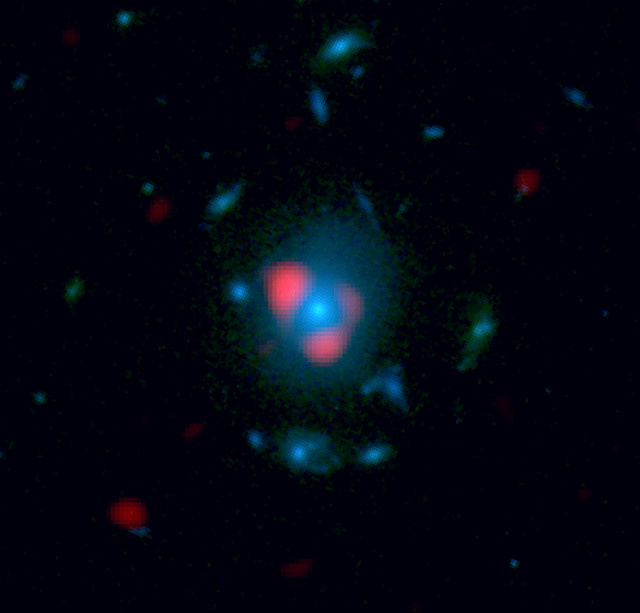Cosmology

The Universe, when examined on the largest possible sizes, contains many mysteries. The gravity responsible for holding galaxies and clusters of galaxies together is provided mostly by dark matter. In galaxy clusters, there is five times more dark matter than the matter that makes up the stars, planets and gas we see. To date, our only insight into dark matter comes from astronomical observations. Furthermore the Universe is not even mostly composed of dark matter, but rather dark energy. Under the influence dark energy, the expansion of the Universe is not slowing down, but is in fact accelerating. The field of Cosmology is dedicated to the study of the Universe as a whole and its evolution.
By observing galaxies and quasars at different distances from us, astronomers at Steward can glimpse snapshots of the Universe at various points in its history. These observations can test and refine our understanding of the Universe. In addition they are necessary inputs into computational simulations that test whether our ideas of the what controls the evolution of the Universe are accurate. Astronomers at Steward are also trying to better understand the properties of dark energy, by examining it's effect on the fundamental constants of physics as measured by absorption lines in quasar spectra, to look for evidence of a new component of the gravitational force.
Faculty and Reserach Staff with a research interest in this area include:
- Jill Bechtold - Quasar Cosmology
- Eiichi Egami - Galaxy evolution, clusters of galaxies
- Tim Eifler - http://azcosmolab.org/
- Xiaohui Fan - High Redshift Galaxies, reionization
- Brenda Frye - High Redshift Galaxies
- Richard Green - Quasar Cosmology
- Chris Impey - Cosmology Outreach
- Buell Jannuzi - Quasar Cosmology
- Elisabeth Krause - http://azcosmolab.org/
- Dan Marrone - Galaxy Clusters & Formation
- Don McCarthy - High redshift galaxies
- Ed Olszewski - Structure & Properties of Dark Matter
- Dimitrios Psaltis - Modifications to General Relativity
- George Rieke - Active Galactic Nuclei
- Marcia Rieke - Observational Infrared Cosmology
- Paul Smith - BL Lac cosmology
- Daniel Stark - High Redshift Galaxies, reionization
- Benjamin Weiner - Galaxy formation and evolution
- Christopher Willmer - Galaxy formation and evolution
- Ann Zabludoff - Galaxy formation, evolution, gravitational lensing
- Dennis Zaritsky - Galaxy Structure & Dark Matter

(Bottom Right) A lensed starburst galaxy. The distant galaxy is shown in red, and it's distorted by the gravitational lens effect produced by the galaxy in front of it (shown in blue). The background galaxy is warped and has taken on the form of an Einstein ring, a circle of light around the foreground galaxy. (Top Left) The Logo for the University of Arizona's recent Cosmic Origins public lecture series.

For Public
Public events include our Monday Night Lecture Series, world-reknowned Astronomy Camp and Mt Lemmon Sky Center.

For Students
A good place to start if you want to become an undergrad major or grad student, or need to find our schedule of classes.

For Scientists
Find telescopes and instruments, telescope time applications, staff and mountain contacts, and faculty and staff scientific interests.




